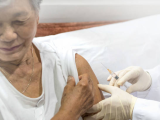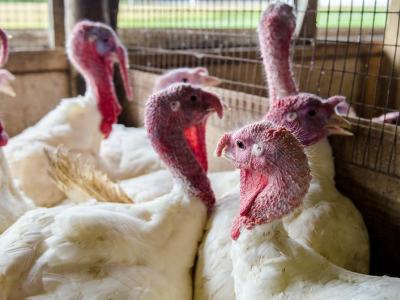Feb 13, 2009 (CIDRAP News) – Because of a suboptimal match between this year's flu vaccine and circulating influenza B viruses, the World Health Organization (WHO) has recommended changing one of the three strains used in flu vaccines for the Northern Hemisphere next fall and winter.
The WHO's choices for the two influenza A strains remain the same as last year, according to new reports published on the WHO Web site this week. The agency recommended keeping the influenza A/H1N1 and A/H3N2 variants used in this year's vaccine, both of which are labeled Brisbane strains.
The influenza B component of this year's flu vaccine was from the Yamagata lineage, but the proportion of strains from the Victoria lineage continues to increase and has become predominant in many countries, the WHO said. The US Centers for Disease Control and Prevention's (CDC's) most recent flu surveillance report, for the week of Feb 1 through 7, said that of 78 influenza B viruses that were characterized, 55 belonged to the Victoria lineage.
Health officials in the United States have discussed including both lineages in the seasonal vaccine to address the unpredictable prevalence of the influenza B strains, especially since a vaccine against one lineage offers little protection against the other.
Last year the WHO recommended a total vaccine makeover for the 2008-09 flu season because of a mismatch to circulating strains the previous season.
Each February the WHO assesses the flu virus strains in circulation before picking the strains for the next Northern Hemisphere flu season. It takes about 6 months for vaccine manufacturers to grow the viruses in chicken eggs and formulate them into trivalent (three-strain) vaccines. Changing one or two strains is not unusual.
The WHO recommends the following for next season's vaccine:
- For the H1N1 component, a strain similar to A/Brisbane/59/2007
- For the H3N2 component, a strain similar to A/Brisbane/10/2007
- For the B component, a strain similar to B/Brisbane/60/2008-like virus, replacing B/Florida/4/2006
The Brisbane strains of H1N1 and H3N2 will be used in this year's vaccine for the Southern Hemisphere, where the flu season runs from May through October, according to the WHO. However, the influenza B component of the Southern Hemisphere's vaccine is similar to B/Florida/4/2006.
In its full report on the strain selection, the WHO said that between September 2008 and January 2009, Africa, the Americas, Asia, Europe, and Oceania all reported influenza activity. Though levels were lower than in the same period last year, activity was higher in some European countries, including the United Kingdom, Norway, Portugal, Spain, Poland, and the Netherlands.
In the Northern Hemisphere, countries such as Japan, Tunisia, and European countries reported regional outbreaks of H3N2 in December and January. In the United States, H1N1 viruses predominated, while in Canada, B viruses were more common.
H1N1 strains that show resistance to the antiviral drug oseltamivir (Tamiflu), one of two neuraminidase inhibitors recommended for treatment, predominated in most regions of the world. No such resistance was seen in H3N2 or B viruses, and there were no reports of viruses resistant to zanamivir (Relenza).
See also:
Jan 16 CIDRAP News story "Experts consider 4-strain flu vaccine to fight B viruses"


















